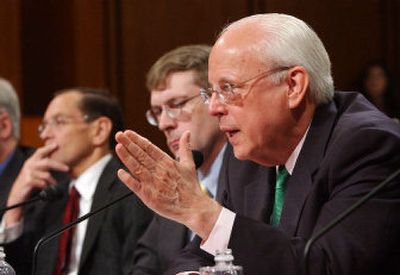Past scandals loom over hearing on censure of Bush

WASHINGTON – Memories of Watergate and Monica, break-ins and cover-ups, hovered like the ghosts of shamed presidencies over a Senate hearing Friday on whether to censure President Bush.
There was John Dean, the former White House counsel who exposed Richard Nixon in the Watergate cover-up nearly 33 years ago, calling for Bush’s censure.
Of fresher vintage was Sen. Lindsey Graham, R-S.C., who as a House member eight years ago helped manage the impeachment trial of President Clinton. Though Graham once advocated censure for Clinton, on Friday he made a case for sparing Bush.
At issue was a resolution sponsored by Sen. Russell Feingold, D-Wis., to censure the president for authorizing warrantless eavesdropping on U.S. citizens as part of the administration’s anti-terrorism campaign.
The censure motion has galvanized liberal activists, but most congressional Democrats have turned their backs on Feingold’s effort. Only two of the Senate Judiciary Committee’s eight Democrats showed up Friday morning to question a panel of five legal scholars and commentators at a hearing convened by Chairman Arlen Specter, R-Pa. No votes were taken.
Significantly, however, the panel’s top Democrat, Sen. Patrick Leahy, D-Vt., said for the first time that he “is inclined to believe” that censure is an appropriate sanction against Bush, lending high-powered backing to Feingold’s move.
“We know the president broke the law,” Leahy said. “Now we need to know why.”
The hearing was at times a high-minded debate over the Constitution and presidential authority and a full-force attack on Bush. Panelists and senators debated Bush’s place in history, inviting comparisons with Nixon and Clinton.
Graham and Specter held a middle ground, disagreeing with Bush’s claim of having the legal authority to wiretap U.S. citizens but rejecting any suggestion that the president deserves some form of official reprimand.
To say Nixon’s cover-up of a political scandal and Clinton’s perjury were “the political and moral equivalent to this president’s decision to surveil the enemy, I think, is absurd,” Graham said.
Sens. John Cornyn, R-Texas, and Jeff Sessions, R-Ala., dismissed the hearings as “surreal” and “beyond the pale.”
“I would suggest we’d better spend our time investigating how a top-secret program such as this, a program fully shared with congressional leaders, was breached and provided to the media and revealed throughout the world,” Sessions said.
Feingold vigorously disagreed: “If we in the Congress don’t stand up for ourselves and the American people, we have become complicit in the lawbreaking.”
The center of attention was Dean, now 67 and the author of the recent book “Worse than Watergate: The Secret Presidency of George W. Bush.” Dean, who spent four months in prison for his part in the Watergate scandal, joked that senators needed to “hear from the dark side.”
“This is a part of a very consistent, long-term, early announced policy of this presidency that they are seeking to build presidential power for the sake of presidential power,” Dean said.